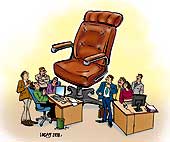 |
Everybody agrees that leaders are the ones who make a difference to an organisation. But no one is quite sure how you create them. Several years after conducting its studies on the top companies for leaders, global human resources services company Hewitt Associates seems to have gone back to the basics. Its 2007 study, which has just been flagged off, intends to “explore the organisational levers that contribute to the development of leadership capability; examine how organisations identify and develop future leadership potential; and analyse the links between leadership practices and organisational performance”.
“In an era of globalisation, with Indian companies making rapid strides all over the world, you need to develop leaders,” says Mumbai-based HR consultant D. Singh. “There is a sense of complacency still because many Indian companies don’t realise what it involves. Secondly, they feel that there is a huge mass of people of Indian origin working abroad at very senior executive levels. Today, this seems good enough for all eventualities.”
Companies like Unilever and IBM have a large number of Indians in their ranks. But if, say, a Dabur or an Infosys wants to poach from these multinationals for their international operations, they won’t find it too easy. Infosys is certainly a professionally-managed company, but its style of working is different from IBM’s.
The only solution for Indian companies is to develop their own leaders. But the pressures have begun to tell. Hindustan Lever, the Indian subsidiary of Unilever, was once known as a school for CEOs. It stood supreme as a marketing company. Today, it has had to import a CEO from Unilever.
The Lever view, of course, is that there is nothing wrong with that. Indians have headed Unilever operations in various countries. So this is, in a sense, more of the same. But a few years ago, if you had to look for a marketing man, your first port of call would have been Hindustan Lever. That is no longer the case today.
A business magazine that wanted to do a story on India’s best marketing men — a follow-up on a story done two decades ago — couldn’t even draw up a shortlist.
The advertising industry — where you could once find much marketing talent — has become a weird place. TV ads, in particular, have gone totally over the top. There are many “brilliant” ads that make you sit up and take notice. But tomorrow, you won’t be able to recall the brand and, sometimes, even the product. Marketing has always been the preferred route to the corner office. In India, that’s no longer true.
It’s not that people don’t realise the problem. At The Conference Board’s annual Global Leadership Conference in Mumbai last year, CEOs expressed concern at the lack of development on this front. The only consolation is that when it comes to creating business leaders, China is much worse off than India.
There are no easy answers to the problem. The Hay Group which has, along with Chief Executive magazine, identified the best US Companies for leaders, has also published a list of the best practices for leadership development. The top three are:
* Having leaders at all levels who focus on creating a work climate to motivate employees.
*Ensuring that the company and its senior management make leadership development a top priority.
* Providing training and coaching to help leadership teams, as well as the individual leaders.
“Leadership development in India will work if executives are given more freedom,” says Singh. “You must create entrepreneurs. Unfortunately, Indian CEOs have not got out of the mindset of micromanagement.”
LEADING THE WAY
The Best Companies for Leaders in 2006
- General Electric
- Procter & Gamble
- PepsiCo
- Citigroup
- Johnson & Johnson
- HSBC Holdings
- BASF
- Home Depot
- IBM
- Coca-Cola
- Dell
- Microsoft
- Novartis
- Verizon Communications
- Nestle
- Lockheed Martin
- GlaxoSmithKline
- Amgen
- Hewlett-Packard
- BAE Systems
(Source: Hay Group)











